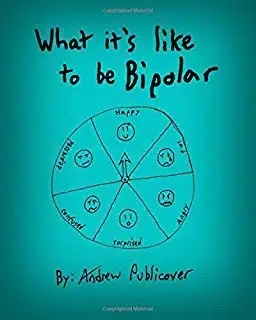Bipolar
Also called manic depression is a disorder associated with episodes of mood swings ranging from depressive lows to manic highs. Treatment can help but this condition cannot be cured. The exact cause of bipolar disorder isn’t known, but a combination of genetics, environment, and altered brain structure and chemistry may play a role. Manic episodes may include symptoms such as high energy, reduced need for sleep, and loss of touch with reality. Depressive episodes may include symptoms such as low energy, low motivation, and loss of interest in daily activities (Fink & Kraynak, 2015). Mood episodes last days to months at a time and may also be associated with suicidal thoughts. Treatment is usually life-long and often involves a combination of medications and psychotherapy. Manic episodes may include symptoms such as high energy, reduced need for sleep, and loss of touch with reality. Depressive episodes may include symptoms such as low energy, low motivation, and loss of interest in daily activities. Mood episodes last days to months at a time and may also be associated with suicidal thoughts (Caponigro & Lee, 2012).

People may experience, mood swings, sadness, elevated mood, anger, anxiety, apathy, apprehension, euphoria, general discontent, guilt, hopelessness, loss of interest, or loss of interest or pleasure in activities. Their behavioral may consist of irritability, risk taking behaviors, disorganized behavior, aggression, agitation, crying, excess desire for sex, hyperactivity, impulsivity, restlessness, or self-harm, unwanted thoughts, delusion, and lack of concentration, racing thoughts, or slowness in activity. Many may experience depression, manic episode, agitated depression, or paranoia, difficulty falling asleep or excess sleepiness.
Treatment consists of medications and therapy. Treatment is usually life-long and often involves a combination of medications and psychotherapy. Common in this disorder is a false belief of superiority, fatigue, or rapid and frenzied speaking (National Institute of Mental Health, 2018). We focus on psychotherapy, psychoeducation, and CBT to modify negative thoughts, identify triggers and behaviors, and emotional responses associated with psychological distress. Education about mental health that also serves to support, validate, and empower patients. Psychological counseling helps families resolve conflicts and communicate more effectively. A preventative service plan is usually in place.
American Psychiatric Association. (2018). Diagnostic and statistical manual of mental disorders, Fifth edition. Arlington, VA.
Caponigro, J.M. & Lee, E.H. (2012).
Bipolar Disorder: A Guide for the Newly Diagnosed. New Harbinger.
Fink, C. & Kraynak, J. (2015).
Bipolar Disorder for Dummies. For Dummies, New York. National Institute of Mental Health. (2018).
Bipolar disorder. Retrieved from https://www.nimh.nih.gov/health/publications/bipolar-disorder/index.shtml on February 27, 2018.
Therapy Modalities
Abuse & Neglect
ADHD
Anxiety
Bipolar
Career Counseling
Communication Difficulties
Couples Therapy
Depression
Eating Disorders
Employee Assistance
Impulsive Behavior
Obsessive Compulsive Disorder (OCD)
Oppositional Defiant Disorder (ODD)
Play Therapy
Posttraumatic Stress Disorder (PTSD)
Self Esteem
Self Mutilation
Shop
Social Skills
Request More Information

